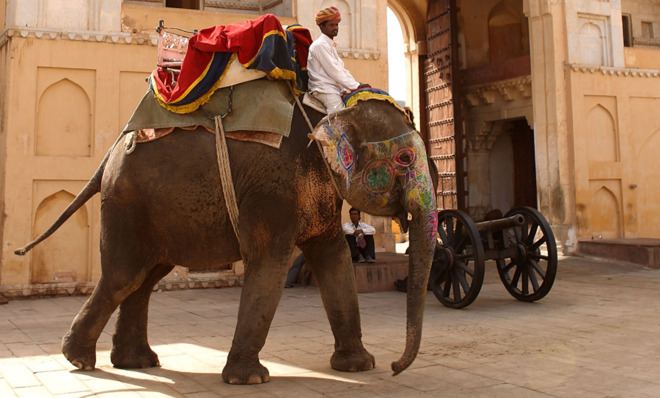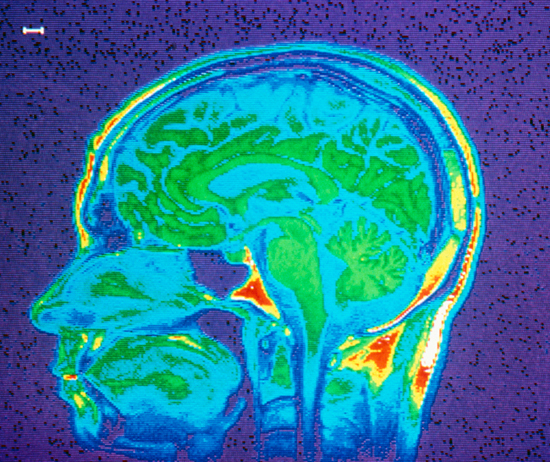3 ways elephants and neuroscience can help you make better decisions
You can outsmart your worst instincts — if you keep things simple

A free daily email with the biggest news stories of the day – and the best features from TheWeek.com
You are now subscribed
Your newsletter sign-up was successful

Here’s a fancy brain picture for you:

Research says that's likely to make you think I know what I'm talking about — even if I don't.
In one clever experiment, David McCabe and Alan Castel had subjects read one of two descriptions of a fictitious research study. The text was identical, but one description was accompanied by a typical three-dimensional brain image with activated areas drawn in color, while the other included only an ordinary bar graph of the same data. Subjects who read the version with the brain porn thought that the article was significantly better written and made more sense. The kicker is that none of the fictitious studies actually made any sense — they all described dubious claims that were not at all improved by the decorative brain scans. [The Invisible Gorilla: How Our Intuitions Deceive Us]
The brain is quite complex and poorly understood — even by experts. As Molly Crockett explains, most everything we read in the media about the brain is grossly oversimplified and often flat-out wrong.
The Week
Escape your echo chamber. Get the facts behind the news, plus analysis from multiple perspectives.

Sign up for The Week's Free Newsletters
From our morning news briefing to a weekly Good News Newsletter, get the best of The Week delivered directly to your inbox.
From our morning news briefing to a weekly Good News Newsletter, get the best of The Week delivered directly to your inbox.
Oxytocin isn't just the "love hormone." And dopamine isn't merely "the reward neurotransmitter." And serotonin isn't just the "happy chemical." Is this a very left brain way for me to look at things? Or right brain? Turns out that distinction is largely misunderstood in the popular media as well.
Sorry. I don't mean to poo-poo all the ways you make sense of what's going on in your head.
So is there a good metaphor for the brain's workings that can help us live our lives better — and doesn't require a PhD to understand?
Yes. And it's actually over 2000 years old — but meshes perfectly with the latest neuroscience has to offer. Here we go.
A free daily email with the biggest news stories of the day – and the best features from TheWeek.com
The elephant and the rider
In The Dhammapada, Buddha compared his desires to an elephant and his discipline to a human trainer:
In days gone by this mind of mine used to stray wherever selfish desire or lust or pleasure would lead it. Today this mind does not stray and is under the harmony of control, even as a wild elephant is controlled by the trainer.
Jonathan Haidt dives into the roots and modern science of this metaphor in The Happiness Hypothesis: Finding Modern Truth in Ancient Wisdom:
The image that I came up with for myself, as I marveled at my weakness, was that I was a rider on the back of an elephant. I'm holding the reins in my hands, and by pulling one way or the other I can tell the elephant to turn, to stop, or to go. I can direct things, but only when the elephant doesn't have desires of his own. When the elephant really wants to do something, I'm no match for him. [The Happiness Hypothesis]
It's an elegant way to understand the primary structure of the human brain. The old parts of the brain are like the elephant: A simple yet powerful creature, ruled by primal emotion and desires. The new brain (or prefrontal cortex) is the rider: Smarter and more rational but easily overpowered. When the elephant is calm, the rider can steer the elephant. This is the "you" you usually identify with. But when you're hungry or tired, when you break that diet or procrastinate against your better judgment — that's the elephant exerting his strength.
Good luck trying to steer that big guy when he gets frightened by a mouse, Mr. Rider.
It's a great metaphor and matches the latest in neuroscience pretty well. In Thinking, Fast and Slow, Nobel Prize winning psychologist Danny Kahneman talks about the two types of thinking: System 1 and System 2. They match the elephant and the rider pretty closely. The problem is I always forget which is System 1 and which is System 2 — but I never forget the difference between the elephant and the rider.
So how does this relate to your life?
Elephant > Rider
When the elephant really wants something, he almost always wins. Maybe this seems depressing. Shouldn't the smart guy be in charge? We need to remember: The rider evolved to serve the elephant, not the other way around.
Fond of eating, sleeping, and being safe, the elephant always keeps the fundamentals in mind. But the elephant does make bad decisions, and the rider can help.
You want to be more productive. You even read articles about it. You develop a fancy system and a schedule. You're feeling good. But that's all for the rider. The elephant doesn't understand any of it. And so you still end up procrastinating. (Turns out your elephant likes TV, chips, and salsa. Go figure.) So how do we make good changes in our lives if the rider is so weak?
3 way to outsmart a willful elephant
The rider can win. He's smarter. But as David Mamet once said, "If you're smarter than the other guy, be smarter than the other guy." There's a way to overcome the elephant but it's not by sheer force. Here are three things you need to do.
1. Keep the elephant calm
Want to lose weight? Don't have donuts in the house. Don't want fights at Thanksgiving dinner? Stop talking about politics. The best way to slow the elephant is not to let him start charging in the first place. Manipulate your environment so as to make what you should do easy and what you shouldn't do hard.
2. Strengthen the rider. And don't let him get tired.
Willpower is a rider who hits the gym regularly. He'll never be stronger than the elephant, but he'll do better than a weak rider. And after a long day, the rider can get exhausted. Not the best time for big decisions.
3. Train the elephant
The elephant is, quite literally, a creature of habit. Fancy arguments don't change his mind. But by breaking bad habits and creating good habits, you can train him to behave better when he gets wound up. These three things can help you align what your rider wants with what your elephant does.
Sum up
Riders and elephants that are on the same page can do great things. Ask Hannibal. As Charles Duhigg explains, much of what we do every day is based on impulse and habit, not conscious thought. In other words, elephant territory.
One paper published by a Duke University researcher in 2006 found that more than 40 percent of the actions people performed each day weren't actual decisions, but habits. [The Power of Habit: Why We Do What We Do in Life and Business]
The elephant knows fundamentals. And he's actually better at complex decisions because he never loses sight of the basics. The elephant's not bad — nor is your "old brain." Einstein knew this. He once said:
The intuitive mind is a sacred gift and the rational mind is a faithful servant. We have created a society that honors the servant and has forgotten the gift.
But your elephant needs a good rider to guide him and make sure he doesn't get out of line. Here's how to increase willpower and here's how to improve your elephant's habits. It's time to start training this guy.
Join 45K+ readers. Get a free weekly update via email here.
More from Barking Up the Wrong Tree...
-
 Switzerland could vote to cap its population
Switzerland could vote to cap its populationUnder the Radar Swiss People’s Party proposes referendum on radical anti-immigration measure to limit residents to 10 million
-
 Political cartoons for February 15
Political cartoons for February 15Cartoons Sunday's political cartoons include political ventriloquism, Europe in the middle, and more
-
 The broken water companies failing England and Wales
The broken water companies failing England and WalesExplainer With rising bills, deteriorating river health and a lack of investment, regulators face an uphill battle to stabilise the industry